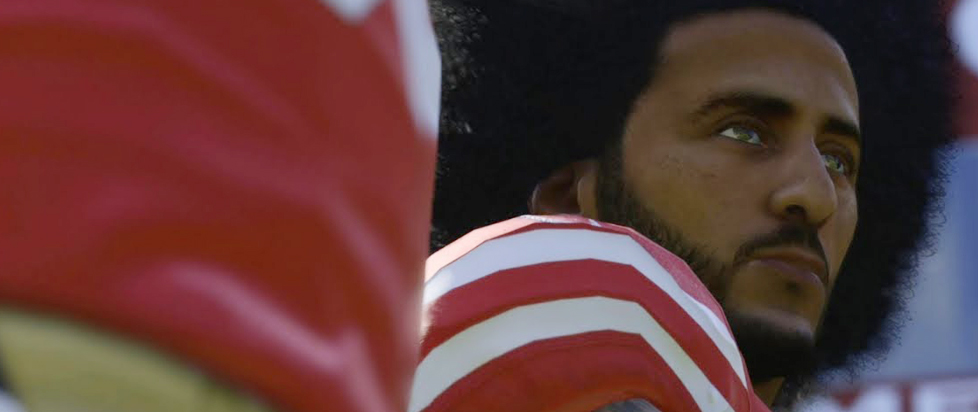
Colin Kaepernick, Madden NFL 21 and the Football Future That Wasn’t
 This column is a reprint from Unwinnable Monthly #132. If you like what you see, grab the magazine for less than ten dollars, or subscribe and get all future magazines for half price.
This column is a reprint from Unwinnable Monthly #132. If you like what you see, grab the magazine for less than ten dollars, or subscribe and get all future magazines for half price.
———
Where videogames meet real life…
———
Electronic Arts announced last month it was adding former professional quarterback Colin Kaepernick to Madden NFL 21 as a free agent, allowing players to assign him to any team of their choosing. The addition comes four years after he was blackballed out of the league, and despite his insistence that he would like to continue his career, there had been no way to play as Kaepernick in the game since 2016. The move reverberated across sports, games, business and political news media alike, showing Kaepernick’s continued cultural relevance (while providing a convenient post-launch PR boost for the $37.89 billion corporation’s critically stale videogame football franchise).
In a sense, this decision can be viewed as a victory for Kaepernick and the Black Lives Matter movement; pushing a massive company to support anti-racism in any way when they previously appeared indifferent is significant. However, while EA worked directly with Kaepernick directly to bring his likeness back to their game on his terms (even adding a Black Power touchdown celebration), it’s hard to ignore the fact that they could have done this at any time in the past four years but didn’t move forward until his odds of playing again effectively dropped to zero. So, why now, and should we make of this?
Let’s start our search for answers by reviewing the company’s announcement tweet:
“Knowing that our EA Sports experiences are platforms for players to create, we want to make Madden NFL a place that reflects Colin’s position and talent, rates him as a starting QB and empowers our fans to express their hopes for the future of football.”
On the surface, this may sound like a sincere acknowledgment of Kaepernick’s talent and the desire of millions of customers to see him take the field once again. There is no doubt many of us would like to see him return to his former glory, and for a generation of kids denied that opportunity, having him in the game would be a welcome sight.

It doesn’t take much to start unraveling what’s wrong with this statement though. For starters, Kaepernick was once a brilliant player in real life and his career never should have been derailed for forcing America to confront police brutality. He should have been on an actual NFL roster every year for the past four years and EA’s public support for his talent and activism would have mattered more when teams could have realistically considered signing him. Now, it would be almost unprecedented for any player to return to form after four years away, making it tough for any team to rationalize signing him.
NFL owners know that NFL talent has a shelf life and this is what railroading him out of the league was meant to achieve; they didn’t have to beat his argument, they just had to outlast him until teams could pass on signing a player who could no longer help them win. As a result, Kaepernick’s starter-quality statistics stretch reasonable belief. His 81 out of 100 rating is better than 17 out of 32 other starting quarterbacks in the game, which is almost certainly inaccurate and a depressing reminder of his squandered skill.
Consequently, EA’s suggestion that they’ve realistically portrayed his abilities right now comes off more like a passive admission of guilt than a sincere show of support. Instead of using their considerable influence to back Kaepernick in 2016 (or 2017 … or 2018 … or, hell, even 2019), it took a confluence of social pressure and a marketable fantasy for them to see an opportunity they could safely capitalize on. Better late than never is better late than never, but they did nothing for years only to sell us a $60 dream when the risk was low, and this looks more like a business decision than actual ally-dom.

Want to see your hero toss the ol’ pigskin around? Now you can! Only on Madden NFL 21. In stores now. Please don’t check our review scores.
Perhaps this shouldn’t be surprising though. Companies exist to make money and not every corporation can pretend they’re trying to save the world; in fact, sometimes appearing disingenuous can do more harm than good. Organizations that employ tens of thousands of people also must be careful with how they make public statements of support for social issues because summarizing the thoughts and feelings of that many people in one paragraph is fraught with issues. It is deceptively difficult territory to tread, and it can partially explain why brands don’t do more when it seems like they should.
With that said, you don’t get credit for risks you don’t take, and large companies also often lose their cautious attitudes about showing their hand on socio-political issues when they’ve run the numbers and determined it’ll be a PR victory. Back in 2016, the (mostly white) media and (mostly white) public treated Colin Kaepernick’s protest like an issue with two valid sides between social justice and respecting the military, despite the fact a Green Beret suggested he kneel because it was more respectful than sitting on the bench. The idea that he was protesting the armed forces was a misunderstanding rooted in lack of awareness at best and a willful and hateful deflection at worst.
By the time the following season rolled around, the conversation started to shift, and Kaepernick was a runner-up for TIME’s Person of the Year. The year after that, Nike made him a spokesperson and they’ve been rolling in cash since. As more white Americans began to see Kaepernick’s protest as just, using his likeness became safer, and more teams and players searched for ways to make statements of their own.

EA had to have seen this happen in real time, and yet did nothing helpful. In fact, they did the exact opposite, and came under fire for removing references to Kaepernick from the lyrics of a Big Sean song included on the soundtrack for Madden ‘19 (the series has long leaned on hip-hop artists for its music, making EA’s tone-deaf approach to social issues even more ironic). While they claimed this was due to confusion around copyright issues, it turned out they removed his name from a song on the ‘18 game too. Seemingly, the only difference that time was no one noticed right away.
It’s likely there are many employees at EA who have been advocating for Kaepernick over the years, and if so, they deserve credit. And for what it’s worth, I’ll still buy the game eventually, even if only for lack of better options. Looking at EA holistically as a corporate entity however, it’s tough to see all the way past their questionable track record on inclusion (this is the same company that once claimed they couldn’t animate female soccer players) and view this through anything other than a semi-skeptical eye.
Before we lose sight of who really helped make this happen, then, we must give more credit to Kaepernick himself for his continued sacrifice, to his allies like former San Francisco 49ers and Carolina Panthers defensive back Eric Reid and to the Black Lives Matter movement for driving the change in the broader culture that has forced corporations like EA and the NFL to respond. Kaepernick’s reappearance in Madden is, if nothing else, a sign that momentum is moving in the right direction. It’s a shame EA couldn’t follow his lead sooner, but in the end, real heroism crushes cowardice.
———
Ben Sailer is a writer based out of Fargo, ND, where he survives the cold with his wife and dog. His writing also regularly appears in New Noise Magazine.




